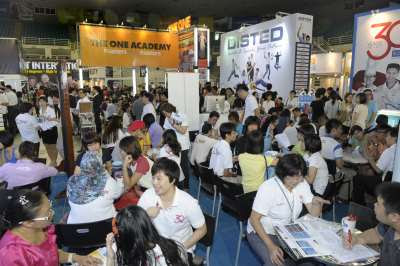On April 6, Chinese Foreign Minister Wang Yi expressed severe concern
over the current tense situation on the Korean Peninsula to U.N.
Secretary General Ban Ki-moon over the phone, and said Beijing "does not
allow troublemaking at the doorsteps of China."


In wake of the rising tensions on the Korea Peninsula, for the regional peace and stability and to safeguard China's national interest, it is necessary to address relevant sides over the issue:
To DPRK: do not misjudge the situation
The Democratic People's Republic of Korea (DPRK) has many reasons to strengthen the arms and technology, and there are legitimate concerns of their own national security, but there is no reason to violate the relevant resolutions of the United Nations Security Council to engage in nuclear testing and launch missile using ballistic missile technology, which cannot shirk its responsibility in upgrading tensions on the peninsula last year.
The DPRK has its own special circumstances, political needs, policy choices and political language style, which is its internal affairs and the outside world has no right to interfere in. But if its choice and words intensifies the Korean Peninsula tensions and affects peace and stability in the region, it becomes the international issues. The situation’s development on the peninsula will not necessarily go according to the ideas and expectations of the DPRK.
To the United States: do not add fuel to the flames
Even with the United Nations Security Council’s resolution on the Korean Peninsula issue, and has legitimate concerns over the nuclear non-proliferation and security issues, unilateral sanctions from the United States against the DPRK which are beyond the UN resolutions would be counterproductive and will add pressure to the situation.
For decades, sanctions, pressure, isolation against the DPRK initiated by the United States is one of the root causes of conflicts on the peninsula. Since the 1990s, U.S. government policy toward the DPRK has swung between engagement and isolation, making the DPRK doubtful of the sincerity of the United States, and giving an excuse to the DPRK in violation of the agreement.
The United States, as the superpower whose comprehensive national and military strength is far stronger than the DPRK's, is in a strong position; therefore, any strong move will only increase tension on the peninsula.
To South Korea: do not miss the focus
With the "protective umbrella" provided by the U.S., South Korea’s security is still fragile. Due to the geographical location and military deployment, South Korea would become the biggest victim if any conflicts and wars break out on the peninsula.
The south and north peninsula have had a period of increased contacts and exchanges, and South Korea's new government has repeatedly expressed its willingness to implement policy toward the DPRK which are different from the Lee Myung-bak government.
Being one of the major parties of the Korean Peninsula issue, South Korea should play the role to cool down the tensions on the Korean Peninsula, rather than pushed by the DPRK or the United States.
To Japan: do not fish in troubled water
Every time North Korea test-fired a satellite or missile, Japan will deploy so-called "interception" in a big way. This is largely a move of Japan taking the opportunity to adjust and increase in arms.
During the process of the Six-Party Talks in the past, Japan sometimes played the role to hold back the process by entangling in some particular issues. This short-sighted strategy and using the pretext of the DPRK "threat" to develop armaments and adjust security strategy will only increase complicated factors in the regional situation.
Warfare and chaos on the Korean Peninsula does not meet the interests of any party. The war caused by trouble will have impact on regional peace and stability, endangering regional cooperation and win-win situation, hurting any party that causes trouble.
Although the situation on the peninsula has not come to the point when conflicts can be triggered at any moment, it has brought harm to regional peace and stability.
Not allowing troublemaking at the doorsteps of China means to stop the vicious circle of tension on the peninsula, to prevent any party from stirring up trouble, to oppose creating tension on purpose, and to say no to render the use of force to resolve the problem. Words and deeds that intensify the tensions on the Korean Peninsula should be condemned and opposed.
Not allowing troublemaking at the doorsteps of China is not China's "Monroe Doctrine". China does not seek spheres of influence. China intends to maintain regional peace and stability on the Peninsula, and determine its own position and actions in accordance with the Peninsula situation on its own merits. At present, it is not without hope to maintain peace and stability on the peninsula.
The pressing matter of the moment is that all parties should calm down and restrain, move to ease the tension as soon as possible to create the conditions for the situation to change.
Related post:
Why North Korea conducts nuclear test?







